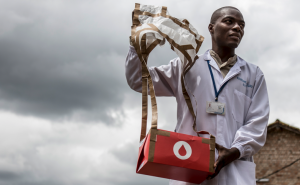TechInAfrica — Averagely, Sub-Saharan Africa’s healthcare quality is the worst in the world, according to the World Bank. It represents almost a fourth of all disability and death caused by disease around the world, yet only 1% of global health expenditure and 3% of the world’s health workers. The infrastructure quality is low and it makes the most basic medical care difficult to access.
Despite the poor quality, technology developments are transforming healthcare in Africa. Drones, apps, and computer-controlled vending machines are among others. It helps knock down barriers and make vital medicines for many people more accessible.
Flying medical aid
Last May, the South African National Blood Service (SANBS) launched drones for transporting blood to solve the high mortality rate among women during childbirth across Africa, says Amit Singh, head of drone operations.
About 295,000 women died globally from the majority of preventable causes related to pregnancy and childbirth in 2017, according to the World Health Organization (WHO). Approximately two-thirds of these deaths occurring in sub-Saharan Africa.
“This was [in part] due to the fact that blood could not get to the patient fast enough, as traditional transport means take far too long due to poor road infrastructure and the distance that needed to be covered,” says Singh.

The drones can endure most weather conditions and only need five square meters (54 square feet) of flat surface to land. The size is smaller than a helicopter.
The SANBS plan follows the success of Zipline, a Californian startup that started delivering blood and vaccines in remote parts of Rwanda in 2016. In April, it expanded its operations to Ghana and now claims to serve 13 million people worldwide.
It allows doctors to put orders through an app. When the orders have been processed, medical products, which are stored centrally at Zipline’s distribution centers, are packaged and flown by drone within 30 minutes to any destination. Then the orders are dropped from the sky with a parachute.
Naa Adorkor Yawson, an executive at Zipline in Ghana, states, “Our just-in-time, instant drone delivery service cuts delivery times down from hours or days to just minutes.”
Remote care
Despite poor healthcare quality, mobile internet users in sub-Saharan Africa are keeping on growing. According to GSMA, the mobile industry’s trade body, smartphone connections in the region reached 302 million in 2018. GSMA expects this to rise to nearly 700 million by 2025.
This is resulting in many apps that enable remote access to medical advice and diagnosis that are established across Africa.
Hello Doctor, a South African app, provides essential healthcare information, access to advice and a call back from a doctor for 55 rands ($3) a month.
Another app is Omomi that helps pregnant women and mothers in Nigeria monitor their children’s health and chat with doctors on a pay-as-you-go or subscription basis. A one-off consultation costs 200 nairas ($0.55), while a monthly subscription to the online platform costs 2,000 nairas ($5.50).
In Uganda, clinical trials are testing an app and device for diagnosing malaria. Matibabu has developed a tool that diagnoses malaria without a blood sample. The device clips on a finger, and by shining a red beam of light on the skin it can detect Plasmodium, a malaria-causing parasite, in red blood cells. The app also allows users to view the results.
Read also: African Telemedicine Platform Connecting Patients with Healthcare Worldwide
Smart lockers
A pesky problem for public clinics is the long waiting times. In 2014, Neo Hutiri had to spend three hours queueing due to a tuberculosis diagnosis. He waited every other Friday to collect prescription medicine from a clinic.
This experience inspired him to develop Pelebox, a smart locker system that dispenses medicine to patients with chronic illnesses. When the medication is ready, patients receive an SMS message with a unique code that allows patients to access the locker.
“Pelebox enables patients to collect their repeat chronic medication in under 22 seconds instead of waiting for hours in queues at public clinics,” Hutiri says in a statement.
He develops the system in hopes that it will reduce the workload for hospital staff and allow them to focus on patients with critical needs. To date, 13 machines are operating in Gauteng. Hutiri also plans to scale his company up to 50, to reach 1,000 communities during the next five years.
Source: edition.cnn.com



